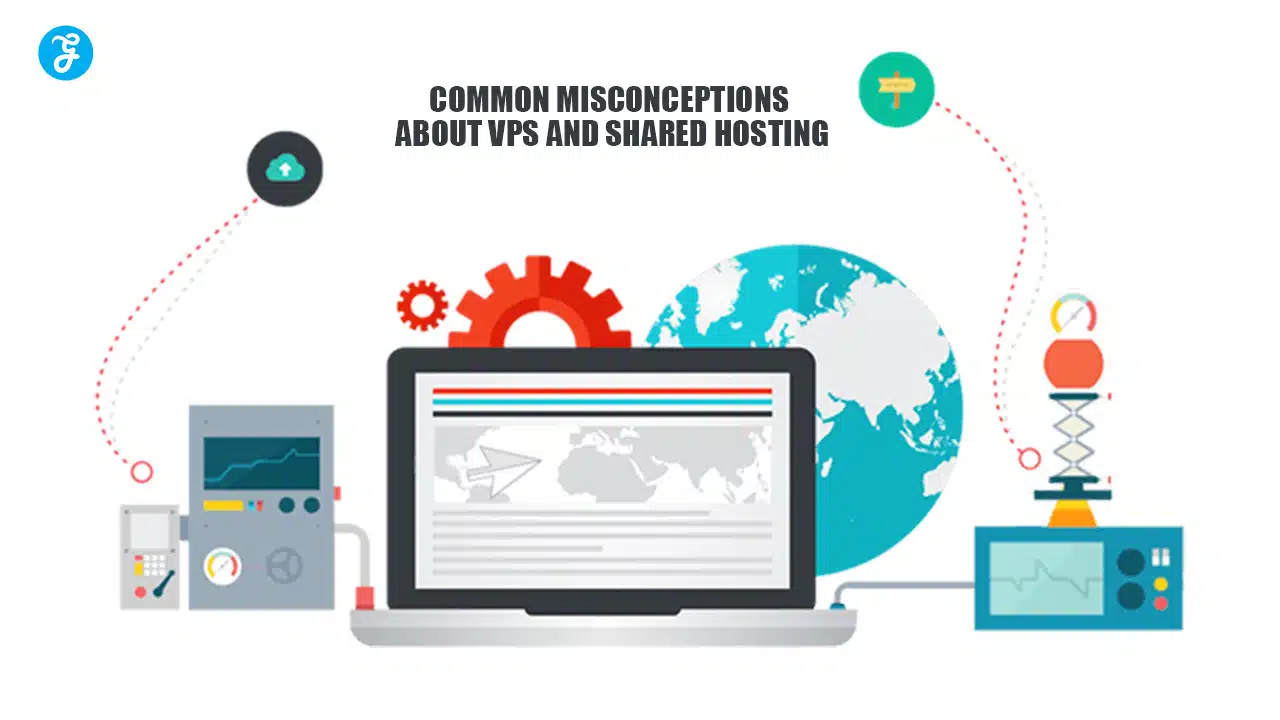When it comes to choosing a web hosting solution, website owners are often faced with two popular options: shared hosting and Virtual Private Server (VPS) hosting.
While both types of hosting have their unique advantages, there are several misconceptions that can make it difficult for beginners and even seasoned website owners to choose the right solution.
Misunderstandings about pricing, performance, scalability, and security can lead to confusion and potentially the wrong choice for your business needs.
In this guide, we’ll address eight common misconceptions about VPS and shared hosting, helping you better understand the strengths and limitations of each option.
By the end, you’ll be equipped with the knowledge to make an informed decision about which hosting type is best for your website.
Why It’s Important to Understand Hosting Options?
Hosting is the backbone of your website’s performance, security, and reliability. Selecting the wrong hosting plan can lead to frequent downtime, slow loading times, or even security vulnerabilities that impact your site’s credibility and user experience.
Understanding the facts about shared hosting and VPS hosting will help you avoid these pitfalls and choose a hosting solution that aligns with your website’s goals and growth trajectory.
8 Common Misconceptions About VPS and Shared Hosting
1. Misconception: Shared Hosting and VPS Are Essentially the Same
One of the most prevalent misconceptions is that shared hosting and VPS hosting are essentially the same because they both host multiple websites on a single physical server. However, the two are fundamentally different in how they allocate resources and handle performance.
- Shared Hosting: In shared hosting, multiple websites are hosted on the same server, and all share the same server resources like CPU, RAM, and bandwidth. This indicates that while each website has access to a portion of the server’s resources, it is still subject to the actions of other websites.
- VPS Hosting: VPS hosting, on the other hand, utilizes virtualization technology to create “virtual” servers within a single physical server. Each virtual server is allocated a dedicated portion of the server’s resources, giving you more control, stability, and scalability.
While both types host multiple sites on the same server, VPS hosting provides an isolated environment with dedicated resources, which allows for better performance and control compared to shared hosting.
2. Misconception: Shared Hosting is Always Cheaper Than VPS Hosting
It’s widely assumed that shared hosting is always the cheaper option, and while shared hosting does generally have lower upfront costs, VPS hosting can provide better value in the long run, especially for websites that require more stability and performance.
- Shared Hosting Costs: Shared hosting plans can be very affordable, often starting at a few dollars per month. However, if your site experiences growth, you might need to upgrade to a more robust plan or migrate to VPS, which could lead to additional costs.
- VPS Hosting Costs: VPS hosting is generally more expensive than shared hosting, but it offers better performance and security. Many VPS plans are scalable, allowing you to add resources as needed, which can make it a cost-effective choice for growing websites.
If your website is expected to expand or if it handles a high volume of traffic, VPS hosting may actually save you money in the long term by providing the necessary resources without frequent upgrades.
3. Misconception: Shared Hosting is Unreliable and Slow
While it is true that other websites on the same server can affect shared hosting, this does not imply that it is inherently unreliable. The performance of shared hosting largely depends on the provider’s server management and how well they allocate resources.
- Quality of Service Matters: Reputable hosting providers invest in infrastructure and use technologies like caching, SSD storage, and load balancing to enhance shared hosting performance. If you choose a quality provider, shared hosting can be a reliable choice for small or medium websites.
- Ideal Use Cases for Shared Hosting: Shared hosting is suitable for personal blogs, small business websites, or portfolio sites that don’t require large amounts of resources or frequent scaling.
In summary, shared hosting can be reliable for the right use cases, particularly if you select a reputable provider with a proven track record of stability and uptime.
4. Misconception: VPS Hosting is Only for Large Businesses and High-Traffic Sites
Many people believe VPS hosting is only for large companies with substantial web traffic, but it can also be beneficial for small businesses or growing websites that need more control and resources than shared hosting can offer.
- Enhanced Control and Flexibility: VPS hosting offers root access and the ability to configure your server environment. This is beneficial for developers and businesses that require specific software installations or configurations.
- Scalability: VPS hosting is highly scalable, making it suitable for websites expecting growth. You can start with a smaller VPS plan and increase resources as your website grows, which is ideal for businesses that want to invest in their future needs.
Small businesses and startup websites often choose VPS hosting when they need more stability, security, or specific software setups that shared hosting doesn’t provide.
5. Misconception: VPS Hosting is Too Complex for Beginners
VPS hosting might sound intimidating for beginners due to its additional configuration options, but many providers offer managed VPS plans that handle the technical aspects for you, making VPS accessible even for those without technical knowledge.
- Managed vs. Unmanaged VPS: With a managed VPS, the hosting provider takes care of server maintenance, updates, security patches, and performance monitoring. This allows beginners to enjoy the benefits of VPS without needing in-depth technical skills.
- User-Friendly Control Panels: Many VPS providers offer intuitive control panels, such as cPanel or Plesk, to help manage your server with ease. This allows you to perform essential tasks like installing applications, managing domains, and monitoring performance without needing advanced skills.
If you’re new to hosting but need the advantages of VPS, consider a managed VPS plan to simplify server management and focus on growing your website.
6. Misconception: Shared Hosting is Not Secure
A common misconception is that shared hosting is inherently insecure due to the shared server environment. However, security in shared hosting depends heavily on the hosting provider’s practices and the website owner’s precautions.
- Security Measures from Providers: Reputable providers implement robust security protocols, including firewalls, DDoS protection, regular backups, and malware scanning to ensure the security of shared hosting environments.
- User Responsibility: Website owners also play a role in securing their sites on shared hosting by using strong passwords, updating software regularly, and implementing security plugins. Following best practices can significantly reduce vulnerabilities.
While VPS provides greater security control, shared hosting can be a secure choice, especially if the provider is reputable and you take basic security precautions.
7. Misconception: Shared Hosting Can’t Handle Any Traffic Spikes
Another common misconception is that shared hosting cannot handle traffic spikes at all. While shared hosting is not ideal for consistently high traffic, it can often handle occasional, moderate traffic spikes if the hosting provider has resources and infrastructure to support it.
- Burstable Resources: Some shared hosting plans include burstable resources, which allow a temporary increase in performance to handle unexpected traffic. This can be sufficient for websites that experience seasonal spikes, such as holiday sales or special events.
- Monitoring and Upgrading as Needed: Shared hosting can be a good starting point, but if traffic spikes become consistent, upgrading to VPS ensures stable performance and the ability to handle high traffic without affecting the user experience.
For websites that only see occasional traffic increases, shared hosting may still be a viable option. However, if your traffic is steadily growing, transitioning to VPS will provide the stability needed for consistent performance.
8. Misconception: Switching from Shared Hosting to VPS is Complicated and Disruptive
Some website owners worry that upgrading from shared hosting to VPS will be a complicated, time-consuming process that disrupts their website’s performance. However, many hosting providers offer migration assistance or services that make this transition as smooth as possible.
- Migration Assistance: Many reputable hosting providers offer free or affordable migration services, where their support team handles the entire process of moving your website to a VPS. This includes migrating files, databases, and configurations, minimizing downtime.
- Minimal Downtime: With professional migration, downtime is kept to a minimum, ensuring that your website remains accessible to visitors. Some providers even offer a temporary staging environment where you can test the site on VPS before making it live.
If you need to upgrade to VPS, don’t let the fear of disruption hold you back. Hosting providers have streamlined the migration process to help your website transition smoothly and efficiently.
Conclusion
Choosing between shared hosting and VPS hosting is a significant decision that can impact your website’s performance, scalability, and security.
While shared hosting is cost-effective and suitable for smaller websites with minimal traffic, VPS hosting offers greater control, dedicated resources, and scalability for growing businesses or more demanding websites.
By understanding and addressing these common misconceptions, you’ll be better equipped to choose the hosting option that aligns with your website’s needs.
Consider factors like traffic volume, budget, technical skills, and long-term growth when making your decision. With the right hosting choice, you can ensure your website’s success and provide an optimal experience for your visitors.







































